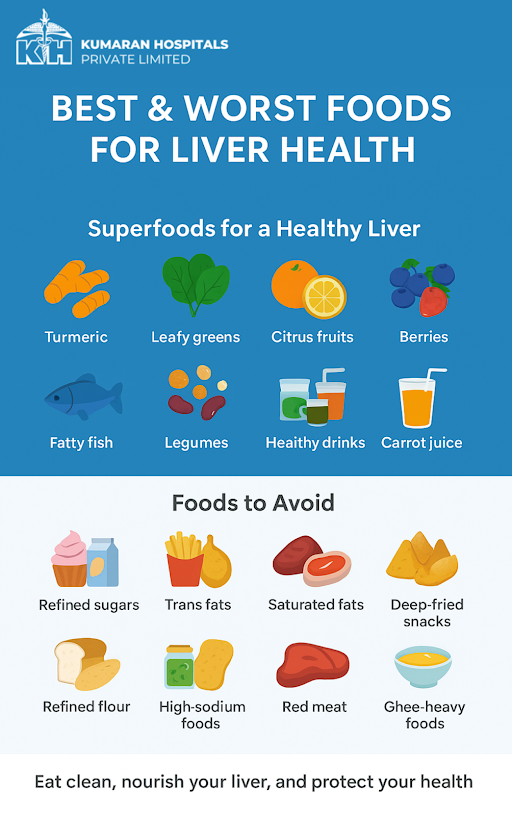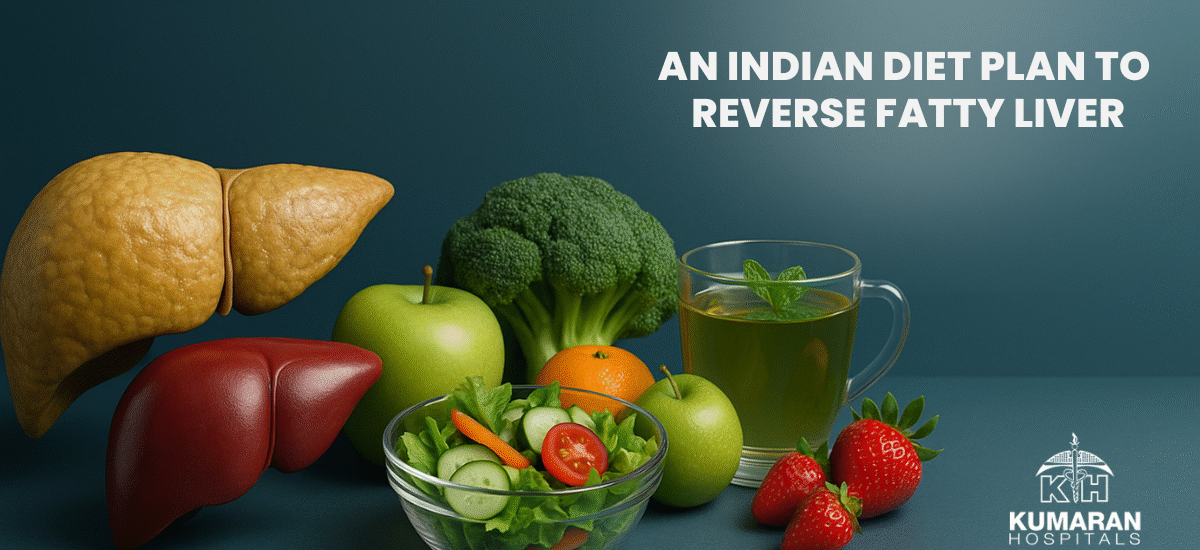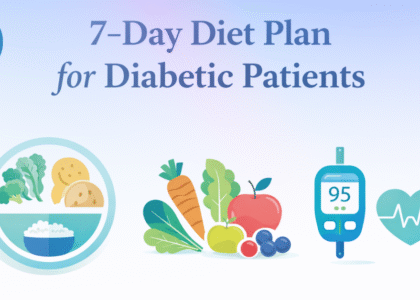Fatty liver disease, also called Non-Alcoholic Fatty Liver Disease (NAFLD), is a growing health concern throughout India, silently affecting millions.
At Kumaran Hospitals, with our deep expertise in liver care, we help patients understand that fatty liver is not a life sentence; it is a condition that can be managed and often reversed through targeted dietary and lifestyle changes.
That’s why we emphasise a comprehensive approach grounded in evidence-based diet and lifestyle changes to reverse fatty liver naturally. You can start by exploring our detailed guide on how diet and lifestyle changes can naturally reverse fatty liver, providing foundational insights.
Building on this, the current blog focuses specifically on the best foods to eat and avoid, tailored to Indian culinary habits, helping you regain liver health while enjoying your cultural food traditions.
Understanding Fatty Liver Disease: A Silent Epidemic in India
Fatty liver disease occurs when excess fat accumulates in liver cells, more than 5% of the liver’s weight. This fat buildup disrupts essential liver functions, increasing the risk of inflammation, fibrosis, and even cirrhosis if neglected.
India faces an alarming prevalence of fatty liver disease. Studies reveal that nearly 38.6% of adults and 35.4% of children are affected. Among urban professionals, especially in the IT sector, this figure rises dramatically to 84.06%. The sedentary lifestyle combined with calorie-dense, nutrient-poor diets is a prime contributor.
“One in three people suffers from fatty liver, which often begins at an early age, as young as five or six years old. “This condition doesn’t appear suddenly in adulthood. It develops due to lifestyle choices”.
This disease’s silent nature means many discover their condition during unrelated health checkups. Recognising this hidden threat should compel early action through an appropriate fatty liver diet plan.
The Best Diet for Fatty Liver: Evidence-Based Principles with Indian Flair
Adopting the proper diet is the cornerstone of fatty liver management. Research consistently supports a Mediterranean-style diet rich in whole foods, lean proteins, healthy fats, and fibre, but culturally adapted to Indian cooking and food preferences.
Key Dietary Guidelines:
- Aim for a gradual weight loss of 7-10%—studies show meaningful liver improvements at this range.
- Prioritise complex carbohydrates such as brown rice, whole wheat, quinoa, and millets over refined grains.
- Include healthy fats, especially omega-3 fatty acids from fish, nuts, and seeds.
- Consume lean proteins through dals, legumes, fish, and low-fat dairy.
- Make vegetables a significant part of every meal, focusing on seasonal, locally available options.
- Limit or eliminate added sugars, refined flour, fried foods, and processed snacks.
Why Indian Foods Work Well:
Indian cuisine naturally includes many liver-friendly foods such as turmeric, mustard seeds, leafy greens, and legumes. With slight modifications, using less oil, selecting whole grains, and balancing spices, traditional dishes can promote liver health without sacrificing taste or cultural identity.
Must-Include Foods to Heal Your Liver
Superfoods with Proven Liver Benefits
- Turmeric: Curcumin reduces inflammation and fat accumulation in the liver.
- Leafy Greens: Spinach, methi (fenugreek), and kale support detoxification.
- Citrus Fruits: Oranges, lemons, and grapefruits supply antioxidants and vitamin C, which promote liver enzyme activity.
- Berries: Blueberries and strawberries offer polyphenols, protecting liver tissues.
- Fatty Fish: Indian fish like pomfret and kingfish provide omega-3 fatty acids, which are critical for reducing liver fat and inflammation.
- Legumes: Lentils, chickpeas, and kidney beans supply plant-based protein and insoluble fibre.
Liver-Supporting Drinks:
- Green Tea: Contains antioxidants that reduce liver fat and improve enzymes.
- Coffee: Moderate coffee intake may reduce liver disease progression risk.
- Fresh Vegetable Juices: Beetroot and carrot juices offer liver-detoxifying antioxidants.

Foods to Avoid for Liver Protection
Avoiding liver stressors is as essential as including healing foods. The biggest culprits contributing to fatty liver progression are:
| Food Group | Reason to Avoid | Common Examples |
| Refined Sugars | Increase in triglycerides and liver fat | Sugary beverages, sweets, packaged juices |
| Trans Fats (Hydrogenated Oils) | Promote inflammation and damage | Commercial baked goods, fried snacks |
| Excess Saturated Fats | Burden fat metabolism | Red meats, full-fat dairy, and ghee in excess |
| Deep-Fried Snacks | High in unhealthy fats, difficult to digest | Samosas, pakoras, bhature |
| Refined Flour Products | Raise blood sugar rapidly | White bread, naan, maida-based foods |
| High-Sodium Processed Foods | Causes fluid retention and inflammation | Pickles, papads, processed snacks |
Sample 7-Day Indian Fatty Liver Diet Meal Plan
| Day | Breakfast | Lunch | Snack | Dinner |
| 1 | Vegetable oats upma + orange juice | Brown rice + dal + mixed vegetable sabzi + yogurt | Green tea + almonds | Grilled fish + quinoa + sautéed spinach |
| 2 | Poha with mustard seeds | Whole wheat roti + moth bean curry + buttermilk | Apple slices + peanut butter | Lentil soup + whole grain bread + salad |
| 3 | Besan chilla with mint chutney | Millet khichdi with vegetables + raita | Sprouted moong salad | Fish curry + brown rice + steamed veggies |
Lifestyle Tips to Boost Fatty Liver Reversal
- Engage in moderate exercise for 30 minutes daily, such as brisk walking or yoga.
- Ensure 7-8 hours of quality sleep to regulate hormones supporting liver repair.
- Manage stress through mindfulness or meditation, as cortisol can promote liver fat.
- Start mornings with warm lemon water or turmeric tea for detox benefits.
- Maintain a consistent meal schedule and avoid late-night eating to allow the liver to rest.
“Achieving and maintaining a healthy weight is essential for reversing fatty liver disease effectively. Kumaran Hospitals offers the Leptyn Weight Loss Program, a medically supervised, personalised plan that combines expert medical evaluation, tailored nutrition, fitness guidance, and behavioural support to help you achieve lasting health improvements safely and sustainably.”
Drinks That Help Reduce Liver Fat
- Green Tea: 3-4 cups daily, taken between meals, significantly reduces liver fat and improves enzyme profiles.
- Coffee: Moderate consumption of 2-3 cups daily supports liver health by lowering fibrosis risk.
- Beetroot Juice: Rich in nitrates and antioxidants, supports natural liver detoxification.
Ayurvedic Recommendations for Fatty Liver
Using Ayurveda principles complements modern science:
- Focus on Kapha-reducing foods, which stimulate metabolism: ginger, cumin, black pepper.
- Incorporate bitter vegetables like bitter gourd to enhance liver cleansing.
- Use spices like coriander and fennel to support digestion and fat metabolism.
- Start meals with a small amount of ginger and rock salt to stimulate digestive enzymes.
Monitoring Progress & Ensuring Long-Term Liver Health
- Track weight, waist circumference, and energy to see tangible progress.
- Schedule regular liver function tests and imaging every few months for medical assessment.
- Allow occasional indulgences but maintain core dietary rules to avoid relapse.
- Adjust diet seasonally and according to personal progress for sustainability.
Comparison Table: Foods for Fatty Liver Management
| Aspect | Foods to Include | Foods to Avoid |
| Carbohydrates | Brown rice, whole wheat, millets | White rice, white bread, maida-based foods |
| Fats | Olive oil, flaxseed, omega-3-rich fish | Excess ghee, deep-fried items, and hydrogenated oils |
| Proteins | Lentils, low-fat dairy, fish | Fatty meats, full-fat dairy |
| Beverages | Green tea, unsweetened coffee, and vegetable juices | Soda, sugary juices |
| Spices and Herbs | Turmeric, cumin, coriander, and fenugreek | Excess salt, processed spice mixes |
Conclusion: Empower Your Liver Health Today
Fatty liver disease is reversible with the proper dietary and lifestyle choices. This fatty liver diet plan, designed especially for Indian tastes and habits, empowers you to protect and heal your liver without giving up the cultural foods you love.
At Kumaran Hospitals, our experienced liver specialists work closely with you to tailor diet and lifestyle plans that fit your unique needs and cultural preferences.
By combining our medical expertise with proven dietary strategies, we help you reverse fatty liver naturally and safely. Consult Kumaran Hospitals to start your journey toward renewed liver health and vitality.
Frequently Asked Questions
A healthy fatty liver diet plan focuses on leafy greens, turmeric, citrus fruits, berries, fatty fish, and legumes, while avoiding refined sugars, fried foods, processed snacks, and excess saturated fats. Whole grains and traditional Indian meals adapted with these foods support liver health naturally.
You can reduce liver fat by following a balanced fatty liver diet plan, staying hydrated, exercising regularly, and managing stress. Drinking green tea, beetroot juice, and carrot juice also helps the liver detoxify naturally.
Citrus fruits (oranges, lemons, grapefruits) and berries (blueberries, strawberries) are rich in antioxidants and vitamin C, helping reduce liver fat and protect liver cells. Regular intake supports liver function as part of a fatty liver diet plan.
Within 14 days, you can start improving liver health by following a fatty liver diet plan: eat leafy greens, legumes, whole grains, and antioxidant-rich fruits, avoid refined sugars and fried foods, and combine this with daily moderate exercise and stress management.
Yes, especially in early stages. Following a personalized fatty liver diet plan, exercising regularly, and maintaining healthy habits can reverse liver fat, improve enzyme function, and prevent progression. Advanced cases may require medical supervision.
Drinks that support liver health include green tea, beetroot juice, carrot juice, moderate coffee, and warm lemon water or turmeric tea. Regular inclusion helps reduce liver fat and supports detoxification naturally.
Early fatty liver is often silent but may include fatigue, mild abdominal discomfort, unexplained weight gain, and digestive issues. Routine checkups and liver function tests help detect it early, allowing timely dietary and lifestyle changes.











